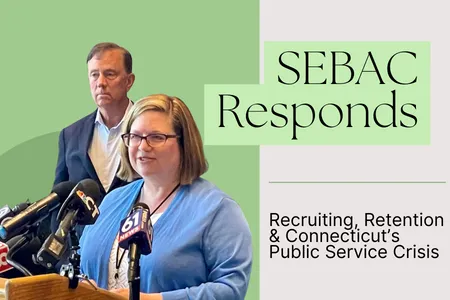State Employees Respond to Recruiting, Retention & Connecticut’s Public Service Crisis

State Employees Respond to Recruiting, Retention & Connecticut’s Public Service Crisis
With over 4,400 retirements in 2022, critical public services are at risk without immediate intervention to address the “Silver Tsunami” by Governor Lamont, administrative department leadership
State Employees Bargaining Agent Coalition (SEBAC) leaders continue to ring the alarm to warn of the major impacts on residents and business of the current state workforce ‘Silver Tsunami.’ Today they are reiterating the urgent call to protect the wide variety of critical public services all 3.6 million people who call Connecticut home rely on.
In the decade after the Great Recession, the state government cut its employee workforce by more than 20%. This destructive trend has accelerated during the pandemic: according to a recent report by the Pew Charitable Trusts, Connecticut public employees (excluding the education sector) were slashed by 7.6% between July 2019 and July 2021 alone -- one of the largest reductions anywhere in the country.
Now, amid the greatest crisis in a century, we have seen over 4,400 retirements since January of this year. The exodus has only exacerbated the destruction of the vital state services that all working people across Connecticut depend on, in particular black and brown, women and immigrant workers.
Union leaders responded to comments this morning by Governor Ned Lamont, Department of Administrative Services (DAS) Commissioner Michelle Gilman and other officials on anticipated additional state employee retirements. Their remarks follow intensive efforts since the start of the pandemic at the worksite, agency and state level to restore eroded services and prevent further loss going forward.
“Commissioner Gillman was right to credit state officials’ ‘union partners’ in addressing the wider public service crisis facing Connecticut residents and businesses,” said University Health Professionals (UHP), AFT Local 3837 President Bill Garrity, RN. “Our recent agreement with UConn Health (UCH) to incentivize keeping clinical care professionals at the bedside is a great 1st step and an example of labor and management working together to plug critical shortfalls.
“Unfortunately, that still leaves many holes still to be filled that if not urgently addressed threaten to worsen the public service crisis,” added Garrity, an emergency department nurse at UCH’s John Dempsey Hospital. “While our unions tackle these shortages locally, we need state government leaders to embrace broad reforms for recruiting and retention, too.”
“While some state agencies were mentioned as having short staffing “hot spots” during today’s press conference, the Department of Correction was not included,” said Collin Provost, correctional officer and President of AFSCME Local 391, representing more than 1,800 correction officers and other front-line employees. “We are down 500 front-line staff throughout our state prisons, and that does not even include the June retirements or the 100 additional posts we were promised would be filled. This alarmingly low level of staffing puts correctional officers at risk every day. We’re currently on track for a record number of assaults on staff. The overtime we have been ordered into is not only unsustainable, but adding more stress on the staff we have. The Office of Fiscal Analysis reported the state spent more than $73 million in overtime costs this year within the DOC. We are exhausted, with no relief in sight. We need a stronger commitment from the state to restaff agencies like the DOC. Our safety and health are in the balance."
“We are actively losing out to other states and the private sector when it comes to hiring, particularly with the highly competitive market for civil engineers,” said Travis Woodward, CSEA SEIU Local 2001 President and Supervising Engineer with the Department of Transportation, “As federal transportation dollars flow into states, Connecticut will lose out on those dollars because we simply don’t have the engineers to do the work. While we’ve made some progress in collective bargaining we must speed up hiring and address the bottlenecks and antiquated practices that have existed for decades that force us to lose out on the talented staff we desperately need.”
“Frontline staff members providing health care, mental health, and addiction services know that Connecticut is facing dangerously low employee shortages that have shut down services to the most vulnerable. People seeking treatment for addiction and children needing psychiatric services have been turned away from lifesaving care because the state has failed to hire enough healthcare workers to provide services,” said SEIU 1199NE President Rob Baril. “For example, we have 1,000 state jobs to fill for direct mental health and addiction services that save lives. Some misguided politicians see the much-anticipated ‘silver tsunami’ wave of retirements as a golden opportunity to cut state services, divesting from the programs that support Black, Brown, API and white working-class communities. But state leaders have had plenty of time to plan for the revitalization of the workforce. It’s time for the Lamont administration to get to work with urgency on hiring Connecticut’s new generation of devoted public servants. At risk-children and those seeking healing from the scourges of addiction and mental illness can’t wait. It’s time to expand services and save lives.”
###
